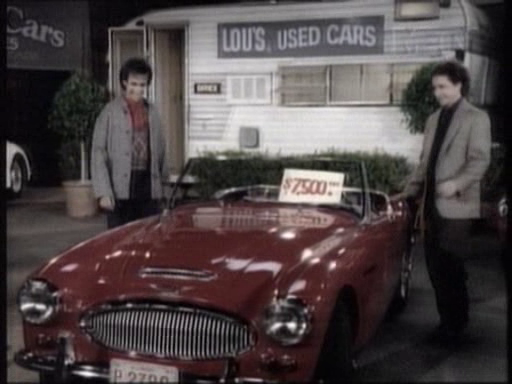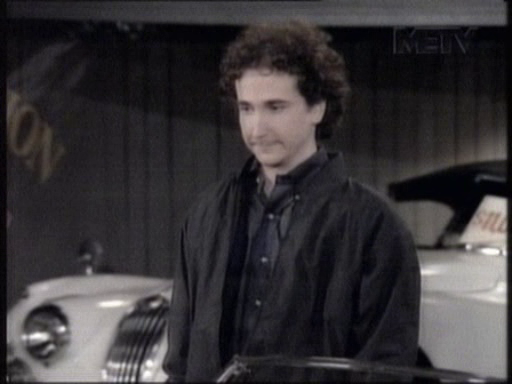Last week’s episode certainly had the most misplaced title ever, but this one’s perfect, because I ain’t saying SHIT this week. Instead, you get a lesson from Professor D, who teaches sociology at University of [undisclosed]! I never took sociology in college, so I’m just going to:

_______________________________

In this episode, Larry and Balki find themselves trapped in a capitalist system that values only their productive power. They have no humanity in the eyes of the newspaper. They are replaceable cogs in the machine. Their situation is best understood using the work of the economist and philosopher Karl Marx.

According to Marx: the cause of human behavior, his conception of society, and the source of social change, all of which can be gleaned from the following quote: “Man makes his own history, but he is not free to make it as he wishes. He makes it under circumstances and conditions not of his own choosing.” Who we are is determined by our social circumstances, the where and when of our lives. Thus we could say that Balki and Larry make their own history, but they are not free to make it as they wish. They are bound by the economic circumstances in which they find themselves.



To paraphrase another famous Marx quote, it is not consciousness that determines men’s existence, but their social existence that determines their consciousness. That is, social context—our interactions with other people, the type of work we do, the historical moment in which we live, the amount of power we have—takes precedence over innate human behavior in shaping who we are. Therefore, one of Marx’s main intellectual projects was to describe how social formations (such as the economy) fundamentally determined the form of society and hence human behavior. He did this through his theory of historical materialism.

In terms of the causes of human behavior, Marx said, “The nature of individuals depends on the material conditions determining their production.” This means that man’s material conditions—the type of economy he lives in, the type of work that he does—produce his culture, his beliefs, and his ideas. For instance, a man living in a capitalist society is likely to believe the salary you make should be dependent on how hard you work as an individual; a man living in a socialist economy is likely to believe that society’s resources should be divided up so that everyone’s needs are met. Though it is unclear what kind of economic formation is found in Mypos, it is clear that it is an underdeveloped pre-industrial agrarian economy. This shapes Balki’s orientation toward work, other persons (including Larry), and sheep.

Marx’s conception of society also stems from this notion. He believed that the economic sector was the base, or the most important aspect of society. Other parts of society, like religion or family or culture, were the superstructure, or dependent on the economic. That is, the superstructure is a reflection of the base. Marx saw the satisfaction of material needs as central in understanding how people behave and felt that people engaged in an ongoing conflict – another central part of Marx’s theory – in order to try to satisfy their needs.

This means that Marx saw history as teleological, progressing through consecutive stages, from agrarian societies to feudal societies to capitalist societies, which were emerging when Marx was writing and which we still have today. For this reason, Marx was centrally concerned with capitalism, trying to understand how this specific mode of production, or type of economy, affected human relationships.

How does Marx define capitalism? First of all, land and labor both become commodities; they can be bought and sold on the open market. He sees the world as divided into two groups: the owners, who own the means of production, and the workers, who sell their labor. If you were not an owner, then you have to be a worker; you have nothing to sell, no way of surviving, except through your labor. In this way, Larry and Balki survive through their labor at the newspaper.

The building up of profit is also new: before this moment in history, there was not much surplus: people either could not store food or wealth, or they didn’t, because they would rather spend the few extra dollars at the local pub getting drunk (or, in the case of Larry and Balki, eating the Sears Tower Ice Cream Sundae). Under capitalism, however, we have profit for profit’s sake. And, at the center of capitalism, is profit. How do the owners make a profit? Marx answered, by paying the workers less than what they produce is worth. For example, if you are an owner of a shoe factory, and you have to pay a worker two dollars to make a shoe, how much are you going to sell that shoe for? More than that. For this reason, Marx saw the relationship between the owner and the worker as fundamentally exploitative; that is, you get paid less than the value of what you make. Thus Larry and Balki’s employers seek to extract as much labor as possible from them in order to make a profit.

This sort of antagonism leads to alienation, which Marx defined as “the separation of things that naturally belong together, or antagonism between things that are properly in harmony.” This sounds complicated, so let’s go back to our example of the shoe factory: imagine you are a worker in a shoe factory. You probably make a tiny piece of the shoe on an assembly line, for example, maybe you punch in the holes for the laces. Of course, you don’t get to take home the shoes that you make—you just work for twelve hours a day so you have enough money to go home, go to sleep, and come back and make shoes the next day. Marx would say you are experiencing alienation in three ways:


You are alienated from the product, because you do not own the fruits of your labor. So the shoe factory worker doesn’t get to take home what he produces . Of course, Larry and Balki could take home a newspaper, but only if they purchased it.


You are also alienated from the process of production, because, using our example, you only make a tiny piece of the shoe and never see the end result. Larry and Balki do not understand the entire process of how to make a newspaper. They are responsible for only a small part of the production process. If left to their own devices, they would not be able to produce the newspaper themselves, though that would certainly make for an interesting episode.


And most importantly, you are alienated from other people. You only relate to them as workers on an assembly line. And you are competing with them! For example, Larry makes himself and Balki into competitors. It is a symptom of the larger alienation felt by workers in the capitalist system. Larry treats his relationship with Balki like an economic exchange. (In fact, Larry reduces everything to economics. He seeks fulfillment in material goods rather than meaningful human relationships. Instead he becomes fixated on buying a classic sports car.)
Do you understand alienation now, Balki?

Let’s bring in a comparison. Think about how shoes used to be made prior to the Industrial Revolution: It used to be the case that shoes were made by people involved in the entire process of production (the leather, the craftsmanship); that you saw the shoe as an end in itself, something you are proud of making, not as a means to an end. And finally, you would relate to other people in a personal way—as friends, as neighbors—not an impersonal way, as managers, as people you have to compete with for your job, for survival (e.g., what if the guy next to you speeds up? agrees to work for lower wages?). But now with the shoe factory worker, YOUR LABOR DOES NOT BELONG TO YOU. This would not be the case if Larry and Balki produced their own newspaper from start to finish. But, because they are laborers for the owners of the newspaper, their labor does not belong to them, but to the owners of the newspaper.
So we see that for Marx capitalism is fundamentally exploitative.

So, what about the superstructure: ideas, morals, laws culture, and religion? They are both the reflection of the ideas of the ruling class and an expression of dissatisfaction with the ways things are. Marx famously wrote, “The ideas of the ruling class are in every epoch the ideas of the ruling class.” Thus the idea of conspicuous consumption is thrust upon Larry (and Balki), making it seem as if the purchase of the sports car is the only way for him to find meaning in his everyday life. In trying to secure the money for the car, Larry essentially tries to sabotage his one potentially meaningful relationship, that with his cousin, Balki. The bourgeoisie would be thrilled by Larry’s efforts.

Marx also said famously, “Religion is the sigh of the oppressed creature, the heart of a heartless world, just as it is the spirit of a spiritless situation. It is the opium of the people.” Think about the beliefs within Christianity—it’s better to suffer on earth for your treasure is in heaven. For Marx, religion then acts as an escape for workers, a way of dealing with their misery. At the same time, Marx sees religion as a symptom of a larger problem when he says it is the sigh of the oppressed creature. Similarly, the Sears Tower Sundae is the sigh of an oppressed Larry and Balki.

So Marx saw religion in quite a negative way, but he also realized its purpose as a cry for help. Religion and morals are what keep people from rising up against the exploitation in their lives but at the same time they allow for solace in the face of misery. This is what Marx calls false consciousness. Marx predicted that eventually, however, people’s lives would get so terrible that they would have nothing left to lose, and they would see through the ideology of the superstructure, shed their “false consciousness” and become aware of their shared circumstances with other workers—they are the same social class—and revolt. Eventually, the workers (or the proletariat) would establish a society in which everyone shared the means of production and there was no alienation—this is Marx’s utopian vision of true human freedom.



Although Larry and Balki do not achieve class-consciousness by the end of the episode, they do, to a certain extent, begin to poke holes in the ideology of capitalism. Larry realizes that being overly materialistic is ruining his relationship with Balki. He comes to see Balki as more of a human and less of a competitor. Together they propose eating Sears Tower Sundaes, which will potentially provide them with the fuel they need for the inevitable proletarian overthrow of the capitalist system. Maybe next episode?

________________________________
Those sure were sociology words! It sounds like this episode was about Larry not buying a car and then Karl Marx bought them some ice cream? I don’t know and NEVER WILL.
See you next week for “The ‘Pen’ Pal”.
Catchphrase count: Balki (1); Larry (2)
Boner count: Balki (0); Larry (0)
Reason #14 that neither you, nor I, nor even Professor D will buy this season on DVD: Balki sings a parody of Patti LaBelle’s “New Attitude” (“Pneumatic Tube”) while shaking his imaginary tits around

“New Attitude”
Oh, I remember this episode. It’s the one where Larry pressures a still-grieving Balki to sleep with Wizard Beaver.
Also, I actually think “Pneumatic Tube” is a pretty good pun, which I say as somebody who enjoys very bad puns.
LikeLike
Are these the first times that Larry and Balki “look into the future” and Balki sits in the fireplace?
LikeLike
Balki also took a dump in the fireplace around this time last season, when Mr. Twinkmiser froze the Caldwell solid.
LikeLike
“…you get paid less than the value of what you make.”
I… just…
…
fuck you, Marxist Strangers.
LikeLike